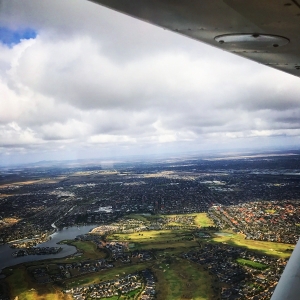Learning something new as an adult is hard
I’m giving myself permission to get it wrong, and have discovered some helpful tips along the way

I’ve recently taken up flying. I don’t mean that I’ve grown a pair of retractable wings and am enjoying a different kind of commuting experience. I’m actually learning to fly a plane.
I very quickly discovered that applying techniques used consistently for 18 years through the British education system meant it was time to reevaluate my approach to learning a new skill as an adult.
We’re spoonfed in schools, learning by rote and regurgitating the information like little photocopiers at the right moment in time to be rewarded with a grade that might hopefully, one day mean we get to mention it in our first job interview. Anything that says: “please think for yourself” is encouraged out of you.
Ken Robinson’s TED talk exploring: “Do Schools Kill creativity?” explains how education is all about ‘getting a job in something’ for the rest of your life. Creativity (“the process of having original ideas that have value”) gets educated out of us.
“Kids will take a chance. If they don’t know, they’ll have a go. By the time they get to be adults, most kids have become frightened of being wrong. And we run our companies like this. We stigmatize mistakes. And we’re now running national education systems where mistakes are the worst thing you can make.”
So, how am I coping as an adult, trying to learn the basics of aeronautical knowledge and put it into practice, ready for my first solo flight?! In short, I’ve had to adapt; and quickly.
I’ve thrown out trying to please my instructor (“be the teacher’s pet”); or do everything perfectly first time (avoiding making any mistakes); and have reconciled that I’ve just got to take a chance and have a go, even if that means I’m not going to get it right first time.
I’m giving myself permission to get it wrong, and have discovered some helpful tips along the way:
Try a new way to school
This issue is not unique to me. Studywithpurpose, is a site dedicated to teaching 18 – 40 year olds’ strategies about how to study as an adult, specifically in the area of higher-education when there is no-one there to hold your hand. Lauren Watson, the creator, and I met at SheMentors a fast-growing, community for women in business in Melbourne and she explained to me that students leave school with the will to study and learn but lacking the core skills to do it effectively as an adult where the teaching environment is vastly different.
Banking some resilience by celebrating the little wins
With each success, our brain releases dopamine. When this happens, we feel greater levels of concentration and are inspired to repeat the activity to get another hit.
So setting small goals along the path to the bigger ones and celebrating all the successes, no matter how big or small, helps us maintain that constant bump of dopamine. In my case, it’s celebrating landing an aeroplane even if I completely missed the centreline of the runway. This approach allows you to exist in a place where you haven’t got to be “the best” for it to mean something.
Optimising my time
Your mind achieves peak performance two-to-four hours after you wake up. If you rise early to do something physical, and then sit down and engage in something, you’ll be doing so whilst your mind is at its peak. For me this translates into an early morning cycle before heading out to the airport or sitting down to work on one of my client projects in digital strategy consulting.
Try, try, try and fail fast
This cannot be applied 100% in my flying example otherwise I wouldn’t be here! Stephen Covey suggests to ‘start with the end in mind’ and this distinctly leaves a nice gap for then being able to explore how to get there. It’s often when you go in the wrong direction that you find your way.
Have fun with it
Most people grow up thinking that play and work are opposites rather than harnessing play to drive innovation and learning. Dara Simkin of ProjectPlay uses Lego Serious Play™ and other tools, such a improvisation, with some of the largest and most traditional organisations in the world to demonstrate how to explore problems through play, develop creative capacities and and give yourself permission to fail.
Seek inspiration from others
You don’t have to do it all on your own. Just as I talk to other pilots to learn about the benefits of armchair flying (yes that’s a real thing); so I also rely on my business network, mentors and peers; and surround myself with people whom I admire to help with my work as a digital and brand strategist.
Some of my favourites include (in no particular order):
- Dave Chaffey’s Smart Insights – tools and templates for everything digital
- IMPact – advice, stories and support for marketers and business leaders
- Seth Godin – incredibly insightful thoughts about marketing and work
- Harvard Business Review – ideas and advice for leaders
- Entrepreneur – News, trends, business
- TED talks – need I say more?
- The Story of Telling – common sense straight to your inbox, everyday
Talk to me anytime, over a coffee, about learning, or flying or strategy.